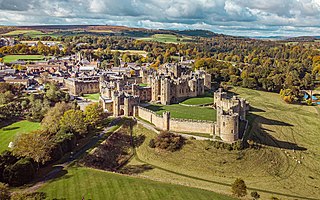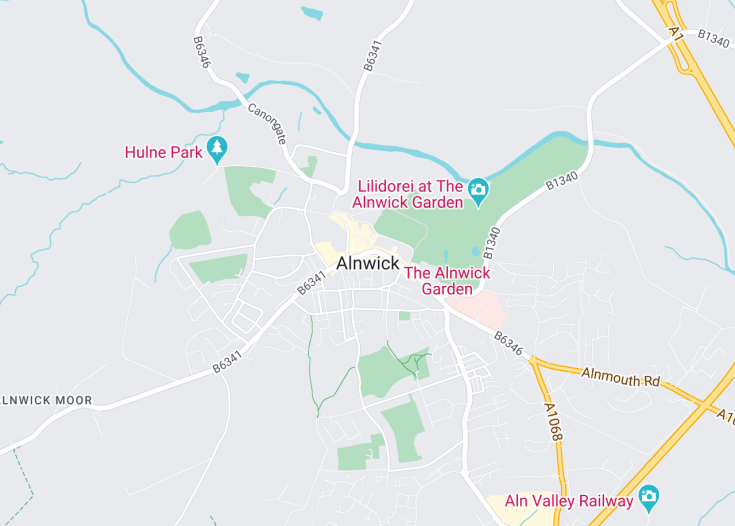Steeped in history and enveloped by natural beauty, Alnwick is a quintessential English market town in Northumberland. Best known for the majestic Alnwick Castle, famously featured in the Harry Potter films, the town offers a picturesque landscape dotted with medieval buildings and cobbled streets. Visitors can also explore the acclaimed Alnwick Garden, a contemporary pleasure garden that boasts a grand cascade and the world’s largest Tai Haku Cherry Orchard. Rich in cultural heritage and natural beauty, Alnwick provides a tranquil escape into England’s historic narrative and lush greenery.
Timed entry to Alnwick Castle can be booked online; it’s advisable to purchase tickets in advance, especially during peak tourist seasons to avoid long queues.
Don’t miss The Alnwick Garden during your visit; the garden’s varied attractions, including the Poison Garden, are both intriguing and educational.
Top things to do & see in Alnwick
Select the following sights and activities to discover best tickets and tours available in Alnwick.
Alnwick: A Historic Gem in the Heart of Northumberland
| Country | England (United Kingdom) |
| Time in Alnwick | GMT+0 |
| Language spoken | English |
| Population | 8,116 (source: latest census data) |
| Currency | British Pound Sterling (£, GBP) |
| Airports |
|
Alnwick is a picturesque town in the heart of Northumberland, England. Known for its rich history, Alnwick has been a settlement since at least 600 AD and serves as the administrative center of the Alnwick district. The town is famously recognized for Alnwick Castle, which not only is a major tourist attraction but has also served as a backdrop in several films and television series, including ‘Harry Potter’. Today, Alnwick combines historical legacy with the charm of rural England, offering visitors stunning landscapes, unique architecture, and deep cultural heritage.
Where is Alnwick?
Alnwick is located in Northumberland, North East England, nestled between the Cheviot Hills and the stunning Northumberland coast.
Distances:
| Route | Distance by car | Time by car |
|---|---|---|
| From London | 309 miles | Approx. 5 hours 40 min |
| From Edinburgh | 98 miles | Approx. 2 hours 10 min |
| From Newcastle | 34 miles | Approx. 50 min |
What is Alnwick famous for?
Alnwick is world-renowned for its iconic Alnwick Castle, often referred to as ‘the Windsor of the North.’ It draws attention not just for its majestic structure but also for its role in films like ‘Harry Potter’ and ‘Downton Abbey.’
History
The rich tapestry of Alnwick’s history begins with its origins as a small settlement and evolves into its current status as a bustling market town filled with historic intrigue and cultural heritage.
Pre-11th Century: Early Settlements
The area now known as Alnwick was primarily inhabited by various tribal groups long before the Norman Conquest. Its advantageous position near the River Aln made it a viable location for early human settlement. Archaeological evidence suggests sporadic habitation by prehistoric peoples, who utilised the natural landscape for hunting and gathering.
11th Century: Norman Foundation and the Alnwick Castle
The pivotal point in Alnwick’s history came in 1096 when Yves de Vescy, a Norman baron, built Alnwick Castle. The castle was strategically significant in defending against Scottish invasions and played a crucial role in the Border wars. Over the centuries, it was fortified and expanded, becoming one of the key military outposts in northern England.
Medieval Period: Market Town and Military Conflicts
Throughout the medieval period, Alnwick developed as a market town, benefiting from its castle’s protection. It received its Market Charter in the 13th century, which contributed to its prosperity. During this period, the town was often caught in the crossfires of England and Scotland’s enduring conflicts. The castle’s defences were tested numerous times and it hosted various historical figures, including kings and influential military leaders.
16th-18th Century: Cultural Development and Turbulence
After the tumultuous medieval era, Alnwick experienced cultural growth, including the development of Alnwick Abbey in the 16th century. However, the town was not immune to national events such as the Civil War, in which the castle played a defensive role once again. Post-war, the 18th century brought economic expansion, notably in agriculture and crafting, further establishing Alnwick as a crucial regional hub.
19th Century Onwards: Modernization and Tourism
The arrival of the railway in the 19th century marked a new phase of accessibility and economic diversification for Alnwick. Tourism began to take root, particularly fueled by the allure of the historic Alnwick Castle, which underwent significant restorations. In the 20th century, the castle gained worldwide fame for its role in various films and television series, notably the Harry Potter films, enhancing its status as a major tourist attraction. Today, Alnwick remains a vibrant community, its history preserved not only in its magnificent castle and gardens but also in the well-preserved medieval street layouts and historical buildings dotting the town.
Visit Alnwick
What to see and do in Alnwick, England (United Kingdom)
Alnwick invites visitors to explore its historic charms and cultural sights. Key attractions include:
- Alnwick Castle, a monumental structure with lush gardens, often hosting live events and historical reenactments.
- The Alnwick Garden, featuring captivating water sculptures and a grand treehouse restaurant.
- The Bailiffgate Museum, which offers insights into the local history of Alnwick and its surrounding area.
- Exploring the town’s cobbled streets, discovering quaint shops and local eateries.
- Walking trails along the River Aln, providing serene views and a peaceful escape into nature.
A Festival of History and Culture
Alnwick hosts various annual events that capture its historical spirit and communal pride. Notable events include the Alnwick Music Festival and the Alnwick Food Festival, both occurring in late summer to early autumn, attracting locals and tourists alike with vibrant displays of music, food, and traditional crafts.
Best time to visit Alnwick
The ideal time to visit Alnwick is between late spring and early autumn, from May to September, when the weather is most conducive for exploring the outdoor attractions and the full slate of local events is in swing.
Is Alnwick worth visiting?
Alnwick, with its deep historical roots and cultural richness, offers a compelling destination for travelers. The iconic Alnwick Castle, coupled with the enchanting Alnwick Garden and vibrant local festivals, make it a worthwhile visit for anyone interested in history, nature, and authentic cultural experiences. Whether you’re exploring its historic sites or enjoying its contemporary offerings, Alnwick provides a unique glimpse into both the past and present of English heritage.










